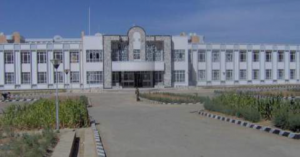 In April 2006, the Italian Dermatological Center (IDC, new denomination assumed by the Italian Dermatological Hospital), in accord with the Tigray Regional Health Bureau and the University of Mekelle, has been moved to the district of Ayder, in the centre of the city of Macallè. The new structure is part of a brand new university hospital, with 450 beds, inaugurated at the same time as the opening of our department.
In April 2006, the Italian Dermatological Center (IDC, new denomination assumed by the Italian Dermatological Hospital), in accord with the Tigray Regional Health Bureau and the University of Mekelle, has been moved to the district of Ayder, in the centre of the city of Macallè. The new structure is part of a brand new university hospital, with 450 beds, inaugurated at the same time as the opening of our department.
The place, further to be new, is also very ample and divided into a wing devoted to the outpatient and one to the inpatient. The IDC has 30 beds, 2 clinics for the external patient checks, a room for the medications, a microbiological investigations laboratory, a surgical room, a room for counselling and the HIV test and a pharmacy, where medicines are free for the patients. The beds have been doubled increasing, therefore, notably the possibility of help and reducing the time of attending for the refuge, where necessary.
There is also a library endowed with computer and Internet satellite connection that also allows the activity of teleconsultation. The IDC, in fact, is part of the Alliance of Italian Hospitals in the world, coordinated by Ministry of Health, which allows the information interchange, consultations and scientific data connecting Italian Health Centers in the World located in 22 countries with the Research Institution for Hospitalization and Care (IRCCS) in Italy.
The new structure, thanks to the amplification of the spaces, to the number of beds and to the accessibility of the hospital, located in the city centre, allowed a general increase of the relief activity in a region in which the pathologies of the skin often represent the first cause of morbidity of the outpatient.
The new spaces, also facilitate the activity of training of the local medical staff, training already started in the village of Quihà with theoretical-practical courses of dermatology, venereal diseases and infectious and tropical disease.
The large space surrounding the new hospital, the waiting room, finally indoor, the free care and the attention wherewith the medical staff responds to the typical kindness of the local population, make the IDC a place of care and reception, in a country in whom the still extreme poverty guarantees health assistance only to that part of population able to pay the medical services.

